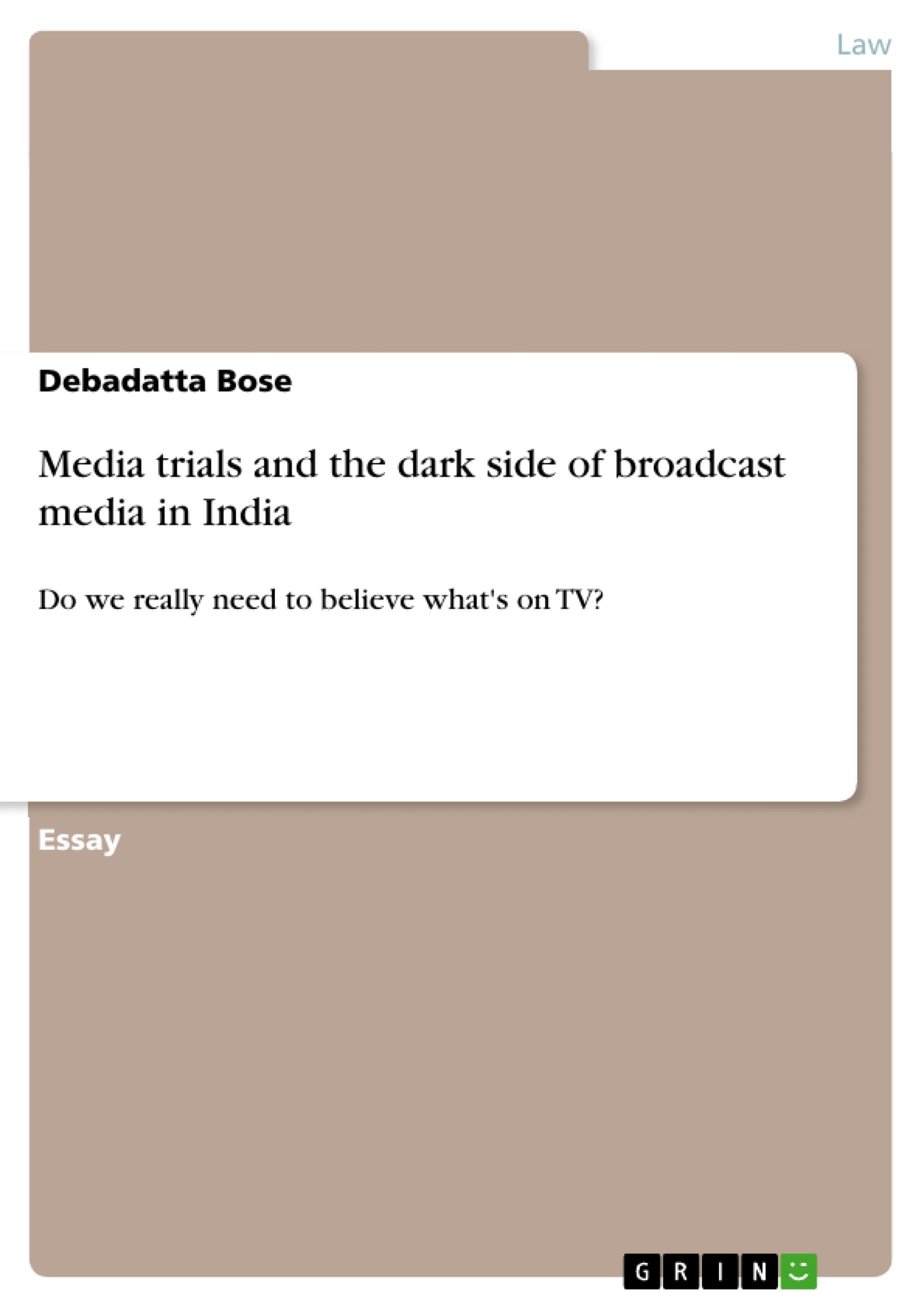Media trials have been a burning issue for many decades, but do they really fit well within the legal framework? This paper shows different perspectives and touches upon issues of human psychology on how the pliable mind of the innocent public is being molded against the judiciary by media trials, and how the public is becoming a puppet in the hands of the media driven by commercial interests.
Social psychology and the various techniques used by the media have been discussed in the book highlighting the unethical and immoral practices of the media that has gone unregulated for decades now without them being accountable to anyone. This essay effectively brings out what the problems are that the judiciaries face with media trials being conducted for ongoing proceedings in a court of law, and the way effective policing can be done on the media to sustain it as the fourth pillar of democracy and yet let it not interfere with the proper administration of justice.
Inhaltsverzeichnis (Table of Contents)
- Introduction
- PART I: THE BASIC CONCEPTS
- A. FREE SPEECH
- B. THE BANDWAGON EFFECT
- C. SENSATIONALISM
- D. INVESTIGATIVE JOURNALISM
- E. FALSE BALANCE
- F. MEDIA'S INTERFERENCE IN THE JUDICIARY
- PART II: SUMMARIZING THE GOOD AND THE BAD
- A. WHY WE REQUIRE A ‘FREE MEDIA’
- B. WHY WE REQUIRE THE ‘FREE MEDIA' TO BE REGULATED
- PART III: WHAT DO WE HAVE TO ABOUT THIS?
- PART IV: THE ULTIMATE CONCLUSION
Zielsetzung und Themenschwerpunkte (Objectives and Key Themes)
This book delves into the contentious issue of 'Media Trial' and its impact on the judicial system. It aims to analyze the psychological effects of media trials on public opinion, highlighting the unethical practices of the media. The work explores the delicate balance between freedom of press and its accountability, advocating for responsible media practices that uphold democratic values while respecting the integrity of the judicial process.
- The psychological impact of media trials on public perception
- The tension between freedom of press and its responsibility to the public
- The impact of media manipulation and sensationalism on the administration of justice
- The need for regulation and accountability within the media landscape
- The ethical implications of media practices in shaping public opinion and influencing judicial processes
Zusammenfassung der Kapitel (Chapter Summaries)
The book commences with an introduction that establishes the context of 'Media Trial' and its relevance to contemporary debates on human rights and ethical media practices. It discusses the historical development of the concept of 'freedom of press' and its potential for abuse.
PART I, "The Basic Concepts," delves into key terms and concepts that inform the discussion of media trials. It examines the concept of free speech and its limitations, exploring the potential for abuse through tactics like smear campaigns. The chapter introduces the 'Bandwagon Effect,' highlighting how media can influence public opinion and shape perceptions through mass communication.
PART II, "Summarizing the Good and the Bad," explores the benefits and drawbacks of a free media. It acknowledges the importance of a free press for a healthy democracy but stresses the need for regulation to ensure responsible media practices. The discussion focuses on the need for media accountability and ethical conduct to maintain public trust and ensure the integrity of the judicial process.
Schlüsselwörter (Keywords)
The book's core themes revolve around 'Media Trial,' freedom of press, public opinion, ethical media practices, judicial interference, responsible journalism, and the Bandwagon Effect. These keywords highlight the work's focus on the complex relationship between media, justice, and democratic values.
Frequently Asked Questions
What is a "Media Trial"?
A media trial occurs when broadcast media conducts its own "investigation" and public judgment of an ongoing court case, often influencing public opinion before a legal verdict is reached.
How do media trials affect the judiciary?
They can interfere with the proper administration of justice by molding public opinion against the judiciary and putting psychological pressure on legal proceedings.
What is the "Bandwagon Effect" in broadcast media?
It is a psychological phenomenon where individuals follow the opinions of the majority—often shaped by media sensationalism—leading to biased public perception.
Should the free media be regulated?
The paper argues that while a free press is essential for democracy, it must be regulated to ensure accountability and prevent interference with the judicial process.
What are the unethical practices mentioned in the book?
The book highlights sensationalism, investigative journalism that crosses ethical boundaries, and "false balance" as tools used by media driven by commercial interests.
- Arbeit zitieren
- Debadatta Bose (Autor:in), 2014, Media trials and the dark side of broadcast media in India, München, GRIN Verlag, https://www.grin.com/document/316997



